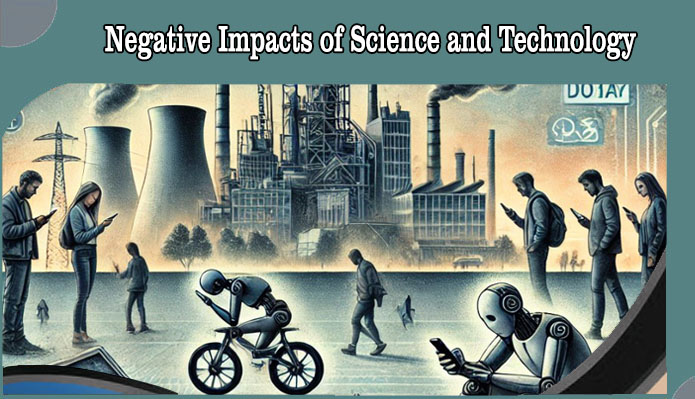The Negative Impacts of Science and Technology Must Be Understood
Science and technology have undoubtedly revolutionized human life, bringing advancements that have significantly improved various aspects of society, from healthcare to communication. However, these innovations also come with unintended consequences that are often overlooked. As we continue to embrace new technologies, it’s important to acknowledge and understand the negative impacts they may have on our environment, society, and even our personal lives.
In this article, we will explore some of the key negative effects of science and technology, addressing concerns such as environmental pollution, social isolation, job displacement, and data privacy.
1. Environmental Degradation
One of the most evident consequences of technological advancement is its effect on the environment. Industrialization, powered by scientific progress, has brought about mass production and the consumption of natural resources at an alarming rate. Factories spew harmful pollutants into the air and water, while the demand for raw materials leads to deforestation and the depletion of ecosystems.
For example, the use of fossil fuels to power industrial machines and transportation systems has led to the emission of greenhouse gases, contributing significantly to climate change. Technologies that aim to harness renewable energy, while promising, still rely on mining for materials like lithium and cobalt, further stressing the environment.
E-waste is another critical issue. As consumers continually upgrade to the latest devices, electronic waste has become a significant source of pollution. Many devices contain toxic materials like lead and mercury, which can leach into the soil and water if not properly disposed of. Recycling programs have been implemented in many countries, but they still struggle to keep pace with the sheer volume of waste generated.
2. Social Isolation and Mental Health
While technology has connected us to the world in ways never imagined before, it has also contributed to social isolation. The rise of smartphones and social media platforms means that many people spend hours each day interacting through screens rather than face-to-face. Although online communication can be effective, it lacks the depth and emotional connection of in-person interactions.
Studies show that the overuse of social media can lead to feelings of loneliness, anxiety, and depression. The constant comparison to others’ seemingly perfect lives, as depicted on platforms like Instagram and Facebook, can take a toll on self-esteem and overall mental health. Moreover, the addictive nature of these platforms, driven by algorithms that encourage users to spend more time online, exacerbates these feelings.
Parents and educators are particularly concerned about how children and teens are affected. Excessive screen time can lead to developmental issues in young people, affecting their ability to focus, communicate, and form meaningful relationships.
3. Automation and Job Displacement
Automation and artificial intelligence (AI) have transformed industries by improving efficiency and reducing costs. However, they have also brought about significant job displacement. As machines and algorithms become more capable, tasks that were once performed by humans are now being handled by robots and AI systems.
The manufacturing sector has been particularly affected. In many factories, robots are now responsible for tasks such as assembly, quality control, and even packaging. While this increases productivity, it also means fewer jobs for human workers. Many lower-skilled jobs are becoming obsolete, leaving workers struggling to find employment in a rapidly changing job market.
Beyond manufacturing, automation is affecting other sectors, such as retail, banking, and transportation. Self-checkout systems, online banking, and autonomous vehicles are just a few examples of how technology is replacing human labor. While technological advances can create new jobs in fields like IT and robotics, these often require specialized skills, leaving displaced workers with limited options.
4. Data Privacy and Security
In today’s digital age, personal data has become a valuable commodity. Companies, governments, and hackers alike are all interested in accessing and exploiting data for various purposes, from targeted advertising to cyberattacks. The vast amounts of data collected through smartphones, social media, and the Internet of Things (IoT) devices raise serious concerns about data privacy and security.
Many individuals are unaware of just how much personal information is being tracked and stored. Data such as browsing habits, location, and even biometric information can be harvested by companies and used for profit. Worse still, breaches in data security can lead to identity theft, financial loss, and reputational damage. In recent years, major corporations like Facebook and Equifax have suffered data breaches that compromised the personal information of millions of users.
Moreover, the use of AI-powered surveillance technologies raises concerns about privacy in public spaces. Governments around the world are deploying facial recognition systems and other forms of surveillance to monitor citizens, often without their knowledge or consent. This presents significant ethical challenges, as individuals’ freedoms may be infringed upon without their awareness.
5. Ethical Dilemmas in Science and Technology
As technology advances, ethical concerns are becoming more prevalent. One area where this is evident is in genetic engineering. Technologies like CRISPR have the potential to eliminate genetic disorders and advance medical research. However, they also raise questions about the ethical implications of manipulating human DNA, particularly when it comes to the possibility of creating “designer babies” or altering traits like intelligence and appearance.
Similarly, the development of autonomous weapons powered by AI has sparked debate over the role of machines in warfare. While these weapons could reduce human casualties, there are concerns about their potential to operate without human control, leading to unintended consequences.
Additionally, the rise of the gig economy has led to debates over labor rights. Platforms like Uber and Lyft have created new job opportunities, but workers in these sectors often lack benefits, job security, and protections typically offered in traditional employment.
6. Dependence on Technology
As society becomes more reliant on technology, the risk of technological dependency increases. From smartphones and computers to household appliances and transportation systems, our day-to-day lives are heavily dependent on machines and digital networks. This raises the question: what happens when these systems fail?
Cyberattacks, system malfunctions, or power outages can bring entire cities to a standstill, disrupting essential services like healthcare, finance, and transportation. The fragility of technological systems underscores the need for robust security measures and backup systems to ensure resilience in the face of potential failures.
Conclusion
Science and technology have undoubtedly contributed to the advancement of society, offering numerous benefits in healthcare, communication, and productivity. However, these advancements also come with negative impacts that must be understood and addressed. From environmental degradation to social isolation, job displacement, and data privacy concerns, the consequences of unchecked technological progress can be far-reaching.
To navigate the challenges posed by science and technology, it is crucial to foster responsible innovation, where ethical considerations and sustainability are at the forefront of decision-making. By understanding the potential risks and taking proactive measures, we can ensure that the benefits of technology outweigh its downsides, paving the way for a more balanced and equitable future.



